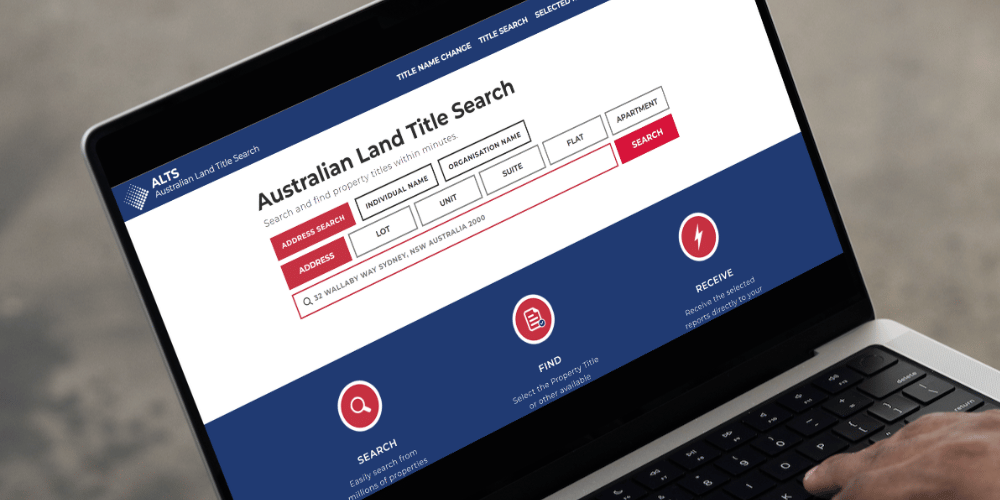Understanding property ownership is crucial when it comes to the process of buying or selling real estate.
One of the fundamental steps in this process is conducting a land title search.
We’ll explore the significance of land title searches and provide an overview of the process involved.
Why are land title searches important?
A land title search is an important part of any property transaction because it provides essential information about a property’s ownership, history and its legal status. Visibility into a property could surface any potential challenges and offer peace of mind.
Land title searches provide:
- Ownership verification: A title search helps confirm the current property owner, and ensures that the seller has the legal right to transfer ownership.
- Encumbrances: It reveals any liens, mortgages, or other encumbrances on the property. These could affect your ability to buy or sell the property.
- Property boundaries: The search may include information on property boundaries, so you know exactly what you’re potentially buying.
- Legal issues: Uncovering legal disputes or pending litigation related to the property is important to avoid potential future headaches.

How land titles are managed and regulated
Land titles in Australia are managed and regulated at the state and territory level, with each jurisdiction having its own specific legislation and system for registering and managing land ownership.
- Torrens Title System: Most land in Australia is governed by the Torrens Title System. This system provides a government-guaranteed title, offering security and certainty of ownership. When you own a property under Torrens Title, your name is recorded on the land title register, and you receive a Certificate of Title as evidence of your ownership.
- Land Titles Offices: Each state and territory in Australia has its Land Titles Office or equivalent authority responsible for maintaining and registering land titles. These offices are responsible for recording all land transactions, including property sales, mortgages, and leases.
- Transfer of Ownership: When you buy or sell a property, a legal process known as conveyancing occurs. This process involves transferring the ownership of the property from the seller to the buyer. Conveyancers or solicitors typically handle this process, ensuring that the transfer is legally valid and registered with the Land Titles Office.
- Certificate of Title: The Certificate of Title is an important document that proves ownership of the property. It includes information about the property, such as its boundaries and any restrictions or encumbrances. In some states, this document is now stored electronically, and a paper certificate may not be issued.
- Encumbrances and Easements: The land title register also records any encumbrances or easements that may affect the property. These could include restrictions on land use, rights of way, or access for utilities. It’s essential to understand these when buying a property.
- Land Title Searches: Anyone can conduct a land title search, which provides information about a property’s title, ownership, encumbrances, and other relevant details. This is most commonly done during the due diligence process when purchasing property.
- Transfer of Land Fees and Stamp Duty: When transferring ownership of a property, you’ll be required to pay fees to the Land Titles Office. Additionally, you may need to pay stamp duty, which is a state or territory tax based on the property’s purchase price.
- Land Title Fraud Protection: Australian Land Titles Offices have implemented various measures to protect against fraud, including electronic conveyancing systems and identity verification processes.
- Leasehold and Strata Titles: In addition to Torrens Title, some properties may have leasehold titles (common in some rural areas) or strata titles (for multi-unit buildings). These titles have their specific regulations and requirements.

Land title search must-knows
Accessing land title information
In Australia, land title information is usually managed at the state or territory level by government agencies. Each state and territory has its own land titles office or equivalent agency. Property information, including title records, can often be accessed online through these government websites or in person at their offices.
Property identification
To conduct a land title search, you typically need to provide specific details about the property, such as its address, lot and plan number, or title reference. This information is used to identify the property in the land titles database.
Requesting a search
You can request a land title search by filling out a form and paying a fee. Some government agencies also offer online search services where you can enter the property details and pay for the search online.
Types of land title searches
- Current Title Search: Provides information about the current property owner, any mortgages or liens, and property boundaries.
- Historical Title Search: Offers historical data on the property, including past ownership, transfers, and historical titles.
- Encumbrance Search: Shows any encumbrances or restrictions on the property, such as easements, covenants, or caveats.
- Plan and Survey Searches: Provide access to survey plans and related documents, which can be important for boundary and development information.
Search results
Once your search request is processed, you will receive a report or certificate that summarises the information available for the property. This report will include details about the property’s current owner, any encumbrances, and other relevant information.
Procedures and access
Methods of conducting land title searches may vary slightly between different states and territories in Australia. We recommend you check the specific land titles office or agency for each state or visit their official website (see Property Registry) for up-to-date and detailed information on conducting land title searches in Australia.

Who might conduct title searches?
Land title searches are commonly completed to gain essential information before buying or selling a property, conduct due diligence, or settle legal matters related to land and property. Typically, a title search is done by:
- Prospective buyers often perform a land title search to check that the property they intend to purchase has a clear title, free from any legal issues or encumbrances.
- Sellers may choose to conduct a title search to confirm the accuracy of the property’s ownership records and to address any potential issues before listing the property for sale.
- Real estate agents may assist buyers and sellers in conducting land title searches as part of their services. They can help facilitate the process and ensure that their clients have a full understanding of the property’s title status.
- Real estate attorneys often conduct title searches as part of their due diligence when representing buyers or sellers in property transactions. They can identify and address legal issues that may affect the transaction.
- Title companies specialise in providing title insurance and conducting title searches. They have access to comprehensive databases and can perform thorough searches to verify property ownership and identify any liens or encumbrances.
- Mortgage lenders may also require a title search as part of the loan approval process to protect their interests and ensure that the property can be used as collateral for the loan.
- In some cases, government agencies or land registries may be involved in title searches, especially when dealing with public lands or properties owned by government entities.

